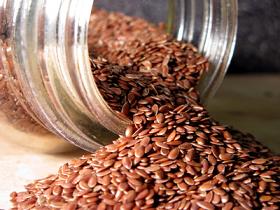
More evidence that low-calorie sweeteners are bad for your health
Studies show that artificial sweeteners can raise the risk of hypertension, metabolic syndrome, type 2 diabetes and heart disease, including stroke.

Natural Health News — Consuming more flaxseed, as part of a healthy diet, could help reduce the risk of breast cancer, according to a new analysis.
This intriguing news, a reminder about the usefulness of cancer-fighting foods, appears as we reach the end of Breast Cancer Awareness month, which, for the most part, focuses on early detection rather than providing prevention strategies.
Flax, say the Canadian research team, is a food and dietary supplement commonly used for menopausal symptoms. It is known for its lignan,α-linolenic acid, and fibre content, components that possess phytoestrogenic, anti-inflammatory, and hormone modulating effects, respectively.
The researchers trawled through all the exiting research records, up to January 2013, which included mention of flaxseed and breast cancer. Out of of 1892 studies,they selected 10 which they felt were of high quality and which looked primarily at the efficacy in improving menopausal symptoms in women living with breast cancer and for potential impact on risk of breast cancer incidence or recurrence.
Strengthening the body
What the analysis showed was that, among women newly diagnosed with breast cancer, flaxseed consumption was associated with fewer hot flushes and a 75% improvement in the women’s mental/emotional state. But it also was associated with several biological changes that could help lower the risk of recurring breast cancer including:
The women supplementing with flax seed also had fewer abnormal cells of the type that can become malignant, improved breast density as measured by mammography and higher anti-angiogenic activity (i.e. their bodies were better able to ‘starve’ tumours of the oxygen and nutrients they need to grow and spread).
Overall a diet rich in flax seed decreased risk of primary breast cancer by 18% and lowered mortality among breast cancer patients by 32%.
Not just breast cancer
Previous studies have shown that substances in flaxseed can inhibit the growth and spread of human breast cancer cells in the lab and in animals. But it also shows the same effect on prostate cancer and melanoma in laboratory and animal studies. It has also been shown to reduce radiation therapy-induced lung damage and improves survival in animals but in one trial was found to be ineffective in preventing oral infection following radiation treatment for head and neck cancer.
In humans flaxseed has been shown to lower tumour biomarkers in men with prostate cancer as well as in women with breast cancer.
Lignan-rich pant foods
Flaxseed is rich in plant hormones known as lignans, and it is these that scientists believe are responsible for it’s anti-cancer activities.
In 2011 three studies including thousands of women diagnosed with breast cancer demonstrated the protective effects of high blood lignan levels. The first, from New York, reported substantially reduced risks of overall mortality and especially breast cancer mortality associated with higher lignan intakes in postmenopausal women.
Another from Italy found that five years after an initial diagnosis of breast cancer women who had lower circulating levels of lignans were significantly more likely to die from recurring cancer than those with more lignans in their bloodstream. It concluded, “Lignans might play an important role in reducing all-cause and cancer-specific mortality of the patients operated on for breast cancer.”
Another large study from Germany found that in postmenopausal women with breast cancer, those with who had high blood lignan levels had better survival rates.
Getting more
Lignans are found in high concentrations in flaxseed (Linum usitatissimum, also known as linseed), sesame seeds and in smaller amounts of fruits, vegetables such as kale and broccoli, whole grains and legumes such as soybeans. Lignans are the Western equivalent of the isoflavones found in soya and have a similar action in the body.
The bioavailability of lignans is greatly improved by crushing or milling the seeds. Lignans are not found in oils so flaxseed oil will not be a good source of these.
Try adding whole flaxseed, or better yet ground flaxseed meal, sesame seeds and whole sesame butter (not tahini) to your diet on a regular basis. Aim for two heaped tablespoons a day, sprinkled on cereal, soups, salads, steamed vegetables, or added to smoothies.
Lignans are a type of plant estrogen and a fat soluble antioxidant that is found in high concentrations in flax seeds, sesame seeds and in smaller amounts of fruits, vegetables such as kale and broccoli, whole grains and legumes such as soybeans. Plant lignans are the principal source of phytoestrogens in the diets of people who do not typically consume soy foods.
Flaxseed is by far the richest dietary source of plant lignans, and lignan bioavailability can be improved by crushing or milling flaxseed. Lignans are not associated with the oil fraction of foods, so flaxseed oils do not typically provide lignans unless ground flaxseed has been added to the oil.
– See more at: http://doctornalini.com/top-high-lignan-foods-that-lower-breast-cancer-risk/#sthash.ZIAh89pc.dpufLignans are a type of plant estrogen and a fat soluble antioxidant that is found in high concentrations in flax seeds, sesame seeds and in smaller amounts of fruits, vegetables such as kale and broccoli, whole grains and legumes such as soybeans. Plant lignans are the principal source of phytoestrogens in the diets of people who do not typically consume soy foods.
Flaxseed is by far the richest dietary source of plant lignans, and lignan bioavailability can be improved by crushing or milling flaxseed. Lignans are not associated with the oil fraction of foods, so flaxseed oils do not typically provide lignans unless ground flaxseed has been added to the oil.
– See more at: http://doctornalini.com/top-high-lignan-foods-that-lower-breast-cancer-risk/#sthash.ZIAh89pc.dpuf

Please subscribe me to your newsletter mailing list. I have read the
privacy statement